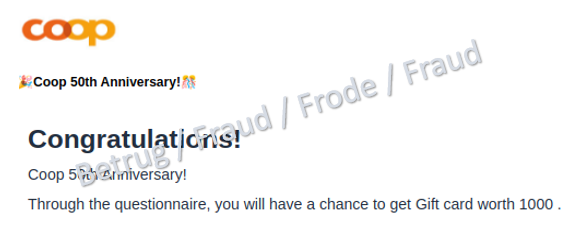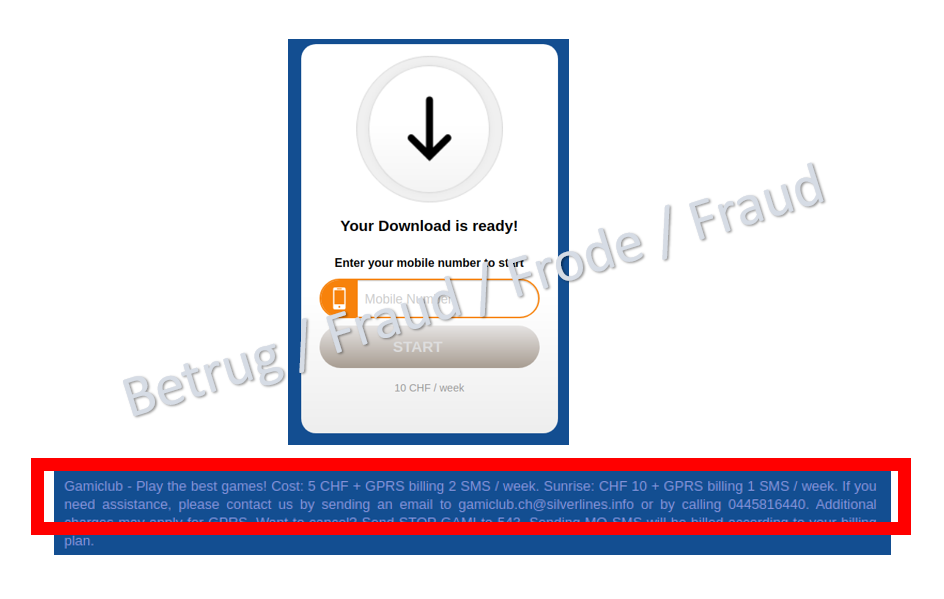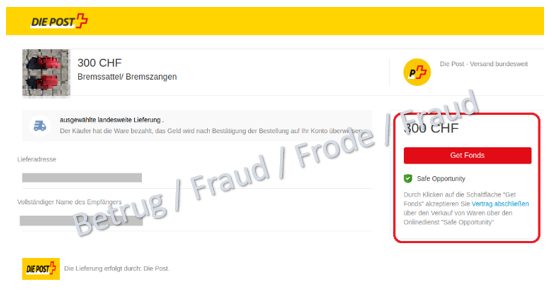28.09.2021 - The NCSC once again received an increased number of reports last week. Fraudulent competitions that claimed to mark the Coop's 50 anniversary were noteworthy. With classified ad scams where the victim is supposed to pay despite selling an item, the fraudsters go to considerable lengths to persuade the victims to hand over their credit card details.

Supposed Coop competition
Last week, the NCSC received a large number of reports on WhatsApp messages about an apparent Coop competition. Numerous examples of this approach have been observed in the past using different company names, including Migros, Mediamarkt and Rolex. The NCSC already reported on this in week 22. After answering a few very simple questions, the victims are supposed to guess which package contains a gift card. Of course, everybody wins a gift card.
However, to receive the gift card, people must first forward the link via WhatsApp to 20 contacts or 5 groups. In this way, the attackers ensure that the scam is spread without them having to do anything.
Finally, the victims are supposed to register and give their mobile phone numbers. What they overlook in their haste is the note telling them that, by registering, they are signing up to weekly mobile phone costs of CHF 10. So, in actual fact, not only do they not receive a gift card, but they also subscribe to a regular charge on their mobile phone bill.
- Be sceptical about messages claiming that you have won something.
- Be particularly careful if you have to give your credit card details or phone numbers in order to access free offers.
- Do not forward such messages.
- If you provided your phone number, please contact your mobile provider.
Classified ad used for phishing
The NCSC also regularly receives reports of scam attempts involving classified ad platforms. In week 17, we described a method in which the seller was supposed to transfer money to the buyer (or to an apparent intermediary company) before the buyer would pay for the goods. These are usually purported shipping fees that are to be prepaid by the seller. In a new variant, the apparent buyers now try to persuade the sellers to hand over their credit card details. The fraudsters go to some lengths by setting up official-looking parcel delivery webpages in order to make the story more believable. In the recently reported cases, the victims received an email with an apparent link to a Swiss Post webpage, on which the transfer can be made and the promised price can be accessed. The webpage, which appears official and has both the Swiss Post logo and a similar internet address, contains not only the fictitious name of the beneficiary, but also a description and picture of the goods for sale. In other words, the attacker has set up a personalised website for each seller! This is of course all designed to dispel the victim's doubts and persuade them to click on the link.
If the victims then click on "Get Fonds", they are diverted to a webpage asking them to enter their credit card details. The fraudsters' aim is to lull their victims into a false sense of security so that, in the second stage, they enter their credit card details without thinking about the fact that it makes no sense to do so in order to receive money.
- Be careful with demands from buyers. Insist on shipping and transaction fees being paid by the buyer. Also write this explicitly in the advertisement.
- Use the classified ad platform's rating system. Check buyers' reviews. However, bear in mind that ratings can also be bogus, especially if there are some very good and some very bad reviews.
Current statistics
Last week's reports by category:
Last modification 27.09.2021













